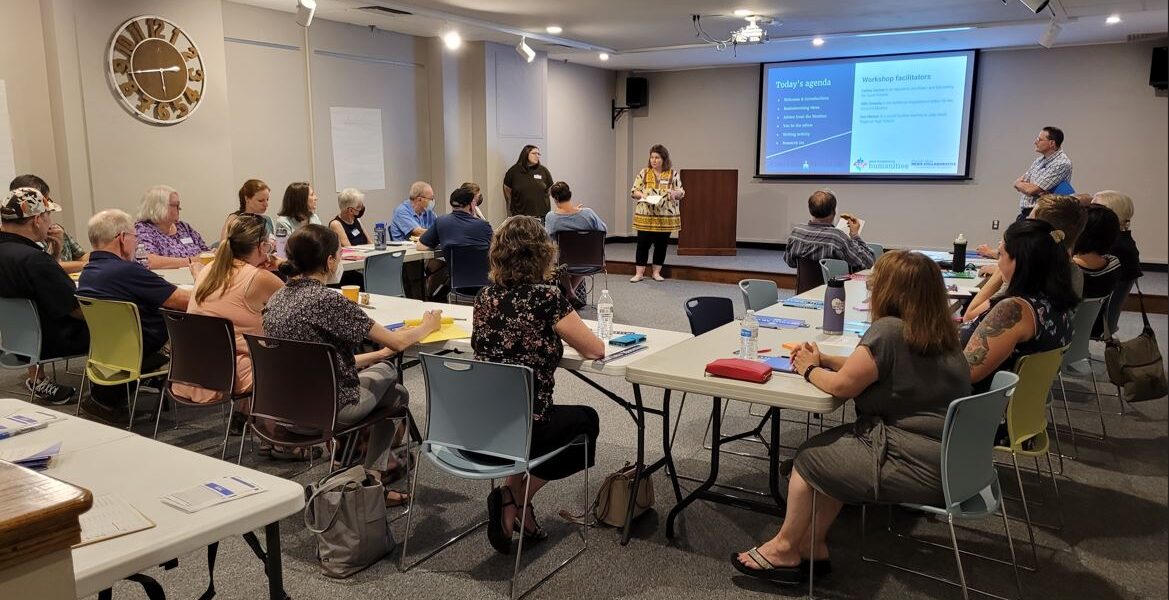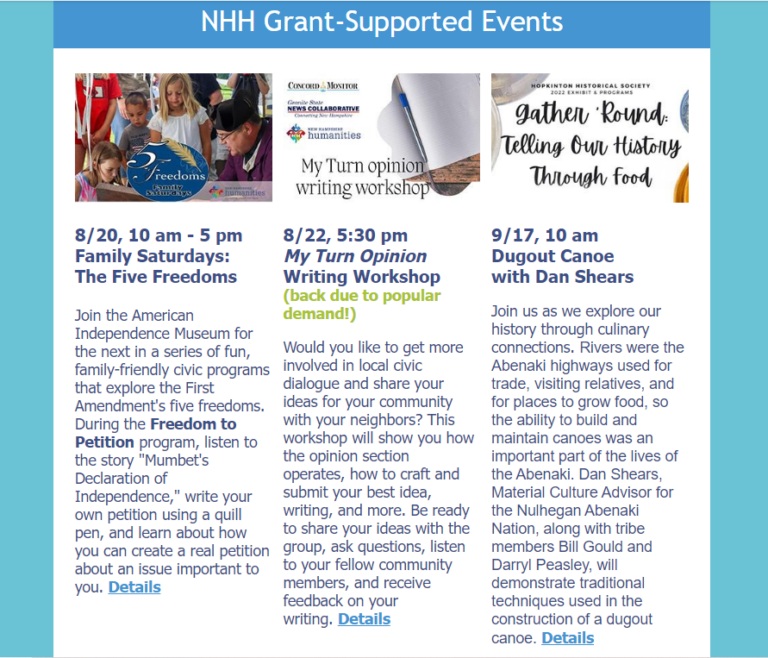How the Concord Monitor brought new voices to the opinion section by hosting a writing workshop series
Allie Ginwala, Concord Monitor, Here’s an idea to steal and adapt: Instead of simply extending the opportunity to be part of the opinion section, why not meet with folks and give them the tools to join the conversation?
Here’s an idea to steal and adapt: Instead of simply extending the opportunity to be part of the opinion section, why not meet with folks and give them the tools to join the conversation? This is a series on Better News to a) showcase innovative/experimental ideas that emerge from the Knight-Lenfest Newsroom Initiative and b) share replicable tactics that benefit the news industry as a whole.
This “win” comes from Allie Ginwala, audience engagement editor at the Concord Monitor, which participated in the 2023 Poynter Table Stakes program.
Question: What problem were you trying to solve, and why was that problem strategically important to your organization?
A: At the Concord Monitor, our opinion section comprises submissions from readers and community members.
On any given day, you could find a My Turn (our term for opinion essays or op-eds) about staff shortages from the head of the NH Health Care Association right next to a debate in the Letters to the Editor about where the city’s new middle school should be located. A vetted forum for a range of thoughtful, reasoned perspectives and ideas, the opinion section serves a vital role in our local newsroom by giving people the space to share their voices with other readers.
We always talk about how we want more voices, new voices, to be part of the opinion section, and we do share that message out often. But unfortunately, inviting participation doesn’t eliminate the barriers some people may face when trying to get engaged in civic dialogue. Putting pen to paper (or finger to keyboard) can often be a daunting task that begs the question, ‘Where do I even start?’ So, we decided to go one step further and give people the resources to start writing.
Having folks within the Capital Region of New Hampshire not only read our news, but also be a part of it, whether sharing their ideas and opinions with their neighbors or reaching out to the newsroom with questions, is vital to our identity as a local newsroom. It’s also vital to our success — people are more likely to trust and invest in a product they feel represented by, involved in, and connected to.
Q: How did you go about solving the problem?
A: To help better equip folks in our region to share their voices on local issues, we developed an opinion writing workshop series.
The first step was applying for grant funding from New Hampshire Humanities, which would allow us to bring into the project two local educators to help design and facilitate the workshops. We received the grant, and I was able to bring aboard Carisa Corrow, education facilitator and founder of Educating for Good, and Dan Marcus, John Stark High School social studies teacher and a regular contributor to the Monitor’s opinion pages.
Together, we met in person and via video chat to develop a curriculum, create materials and design activities. We decided to offer a two-hour, active participation workshop held at the Concord Public Library, with this goal in mind:
“Our hope is that by the end of the workshop, you’ll leave with a new idea of what you want to write about or have a better understanding of something you’ve already started. We strive to give people the knowledge and tools to become a more informed community, encourage more civic engagement, and feature more local voices in their local news source.”
A highlight of what we created was an informational activity booklet for each participant.

Promotional art used across platforms highlights the program and our partners. (Allie Ginwala)
Q: What worked?
A: Much of the success of this series rests in the strength of our partnerships.
We needed additional funding to host a program of this size. The Concord Monitor is a member of the Granite State News Collaborative, and through the Collaborative, we successfully applied for grant funding from New Hampshire Humanities.
With that grant, we had stipends to offer our education facilitators, Dan Marcus and Carisa Corrow, who were an essential part of bringing this series to life. As an editor, I’m able to answer questions about the Monitor and offer guidance and insight on how the opinion section operates. But I’m not an educator, so having two professionals from within that space to help give people direction on forming an argument and how to properly vet sources added so much substance and value to what we were able to offer.
We used Eventbrite as our central hub of workshop information, which allowed us to easily share and also capture details from the folks signing up. We wanted to know their names, town, contact information and why they were interested in joining. The workshop generated so much interest that we had to set up a waiting list (a useful Eventbrite feature) and ultimately held an additional workshop.
Our outreach was a mix of in-house and external. We wrote a column about the workshops for the paper and website, sent emails directly to readers, and handed out flyers at community events. We put posts on social media and asked our partners and community stakeholders to do the same.
A wonderful outcome of the workshop series was an increase in the amount of submissions we received, both from first-time and returning writers. About five people who attended a workshop had a Letter to the Editor published for the first time in the months that followed. Most of them were writing about issues within their towns. One woman, who occasionally submitted Letters to the Editor in the past, decided to write and submit her first My Turn opinion essay after attending the July workshop. She now writes My Turn essays every couple of weeks for the Monitor and other local publications.
An exemplary outcome came by way of one man who had occasionally submitted My Turns over the years. He attended the July workshop, and since then he has become one of our regular writers, submitting a My Turn almost every week. In addition, his My Turns spark a lot of conversation within our readership, who regularly write Letters to the Editor responding to his writing, adding to his perspective, or disagreeing with him.
Q: What didn’t work?

Our grant provider, NH Humanities, shared information about the second workshop we added due to popular demand. (New Hampshire Humanities)
A: After our first workshop in July 2022, we met as a facilitator team and talked about what adjustments we should make before the second workshop the following month.
We decided to factor in more time for participants to talk to one another. We balanced that by lessening the ‘instruction’ from the facilitators and instead added small group, breakout lightning rounds. In groups of three, participants each shared their ideas of what to write about and gave feedback to others. We also made more time for folks to ask questions. We learned at the first workshop that people had all kinds of questions about the Monitor beyond the opinion section.
Our overall reflection after the series was complete was that a bigger space would have been better. We were limited both by the physical space of the community room in the library and the fact that we had only three facilitators. For each workshop, we limited attendance to 30 participants.
Q: What happened that you didn’t expect?
A: While the workshops were well received, and lots of people wanted to learn and talk about the opinion section and the issues important to them, we discovered that folks had a lot of questions about how their local newsroom operates in general.
This workshop gave us the chance to help them understand the Monitor better. Providing awareness of how the newsroom operates and making space for questions and discussion between Monitor staff and the communities we cover boosts our ability to build trust and offer transparency.
We were also surprised by how many people would have liked a workshop longer than two hours. We asked folks to fill out a brief exit survey (we gave them a hardcopy and digital version) and the feedback overwhelmingly showed a desire for more workshops and community gatherings centered on civic dialogue, which to me reveals a gap that needs to be filled.
Q: What advice would you give to others who try to do this?
A: Make sure you set the space, both physically and conceptually. We set up our tables and chairs in a U shape and had the booklets, a notebook, pens and pencils, and sticky notes at each place. We also always had refreshments (pastries, coffee, sandwiches, seltzers, etc.) and made sure to point out where the restrooms were and that no one needed permission to step away.
We also opened the workshop with a discussion of our ground rules, which center on two main points — Don’t be mean and respect each other’s humanity, privacy, and space. I think it’s also important to clearly state if and how a person’s words may be used. For us, we made clear that our team and those involved in putting on the workshop would not quote anyone or use their name without permission, but that aggregate or anonymized information may be shared about the workshops.
Q: What’s next for this work?
A: We partnered with Our Story NH, a local storytelling project, to offer a different version of our opinion writing workshop for those who wanted more direct feedback on their writing and ideas.
Right now, we don’t have more workshops planned, but we did create a landing page to make all of our resources and materials available to other newsrooms who might like to bring this workshop to their readers. You can check it out here.